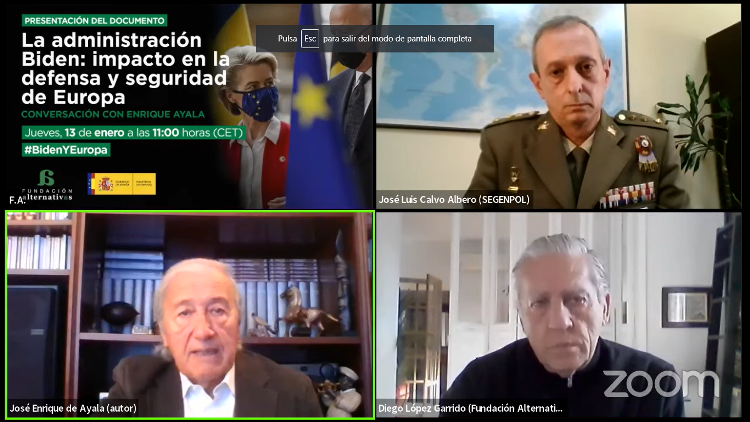Marta Martínez
The rebirth of Russia as a global power against the West and the arrival of Joe Biden to the White House could help relaunch the importance and cohesion of NATO to the detriment of the EU, which has been left out of the debates on its own security and should strengthen its defensive capabilities and strategic autonomy because “the US is no longer the guarantor of security.”
These are some of the conclusions of the debate held last Thursday on the occasion of the presentation of the report The Biden Administration: impact on the defense and security of Europe, prepared by José Enrique de Ayala, of the Council for European Affairs of the Alternativas Foundation.
According to the vice-president of the Foundation, Diego López Garrido, “it could be said that the growing tensions between Russia and the West, as well as with Eastern countries such as Ukraine, have revived the importance of NATO, lost after the end of the Cold War”, as has become evident with the talks between Russia and the Alliance during the past week (especially at the NATO-Russia Council in Brussels), in which Moscow presented its “extravagant” proposal to NATO: To stop admitting new members in Eastern Europe and to withdraw its forces on its eastern border. This is coupled with the deployment of 100,000 Russian troops on the Ukrainian border.
In response to these approaches, José Luis Calvo Albero, director of the Coordination and Studies Division of the General Secretariat for Defense Policy (SEGENPOL), admitted that the revival of Russia as a potential threat could help NATO to regain cohesion. In contrast, he warned, the EU continues to play a secondary role in security and defense matters due to its limited capabilities. Therefore, he continued, if the Union wants to be a strong international player it must have its own European defense, which would be the only way to achieve real sovereignty. Otherwise, it will continue to need to turn to the United States every time it has security problems with neighboring countries.
For his part, De Ayala said that Putin’s message is very clear: for economic issues he will turn to the EU, but for security he will turn to the United States, which is the country that has the leadership in NATO. “It is terrible that the future of Europe is being discussed without the presence of the EU,” he lamented, referring to the talks between Russia and the Alliance, which are precisely addressing the security and defense of Europe itself. In the opinion of the report’s author, the EU needs greater cohesion in defense policy in order to achieve strategic autonomy and thus dissociate itself from the US. “Without a clear European unity, it is impossible to make progress in common defense,” he warned.
Precisely, another of the important points of the report is the new role of the US after the end of Donald Trump’s presidency, which did not attach any importance to NATO or bilateral relations with reliable allies with its “isolationist, unilateral and focused on US national interests strategy”.
This situation, which seriously deteriorated NATO’s well-being, has changed with the arrival of Joe Biden in the White House, who “marked a break with Trump’s theses” with his desire to rebuild transatlantic relations and eliminate tensions with his European partners. “Trump despised NATO, and Biden is now trying to restore the allied strategy,” Calvo pointed out.
However, according to De Ayala, this does not imply that US interests have changed, since, on the one hand, Biden’s domestic situation seems unstable as the mid-term elections approach, in which he may lose his majority in the chambers, and on the other, the global geopolitical axis has changed and US interest is now in the Indo-Pacific and in competition with China, which places Europe in the background and the European Union in a not so essential ally as it was during the Cold War. “Europe has to assume that the US is no longer the guarantor of security, and must take responsibility for its own defense,” warned the report’s author.







